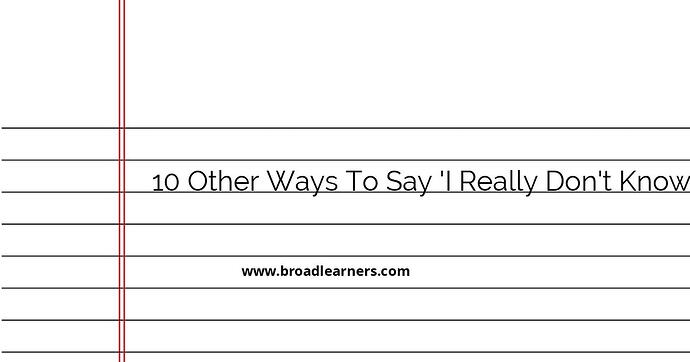Do you find yourself frequently using the phrase 'I really don't know'?
While it's important to be honest when you don't have an answer, there are other ways to express uncertainty without sounding repetitive.
Here are 10 alternative phrases you can use instead of saying 'I really don't know':
- I'm not sure
- I don't have the answer
- I'm unable to say
- I can't say for certain
- I'm uncertain
- I'm not knowledgeable about that
- I'm not familiar with that
- I don't have the information
- I'm unaware of the answer
- I'm at a loss
Let's explore each alternative phrase with examples:
1. I'm not sure
This phrase is a polite way to express uncertainty without sounding dismissive.
Example: 'I'm not sure about the date of the meeting. Let me check and get back to you.'
2. I don't have the answer
If you genuinely don't possess the information, this phrase is a straightforward way to admit it.
Example: 'I don't have the answer to that question, but I can find someone who does.'
3. I'm unable to say
When you are unable to provide a definite answer, this phrase conveys your lack of knowledge.
Example: 'I'm unable to say whether the project will be completed by the deadline.'
4. I can't say for certain
If you are uncertain or don't have enough information to provide a definitive answer, this phrase is appropriate.
Example: 'I can't say for certain if the product will be available in stores next month.'
5. I'm uncertain
When you are unsure about something, using this phrase acknowledges your lack of certainty.
Example: 'I'm uncertain about the details of the new policy. I'll gather more information and let you know.'
6. I'm not knowledgeable about that
This phrase implies that you don't possess the specific knowledge or expertise on the topic being discussed.
Example: 'I'm not knowledgeable about the technical aspects of the project. You should speak to our IT team.'
7. I'm not familiar with that
When you are not acquainted with a certain topic, using this phrase shows that you lack familiarity.
Example: 'I'm not familiar with the new software. Can you provide me with some more information?'
8. I don't have the information
If you don't possess the necessary information, this phrase conveys your lack of access to or knowledge of it.
Example: 'I don't have the information about the client's budget. I'll reach out to the finance department for details.'
9. I'm unaware of the answer
If you are genuinely unaware of the answer, this phrase suggests that you lack the information.
Example: 'I'm unaware of the answer to your question. Let me consult my colleagues and get back to you.'
10. I'm at a loss
If you are completely clueless or have no idea about something, this phrase conveys your lack of knowledge or understanding.
Example: 'I'm at a loss as to why the system isn't working. We'll need to involve the IT team to investigate.'
Next time you want to express uncertainty, try using one of these alternative phrases instead of repeating 'I really don't know'. Remember that clear and respectful communication is key.
Did I miss anything? Respond below
